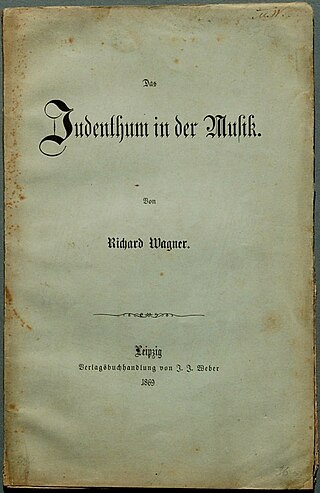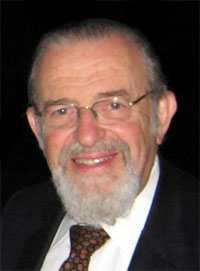
In Judaism, the concept of the Jews as the chosen people is the belief that the Jews, via descent from the ancient Israelites, are the chosen people, i.e. selected to be in a covenant with God. The idea of the Israelites being chosen by God is found most directly in the Book of Deuteronomy as the verb baḥar (בָּחַר), and is alluded to elsewhere in the Hebrew Bible using other terms such as "holy people". Much is written about these topics in rabbinic literature. The three largest Jewish denominations—Orthodox Judaism, Conservative Judaism and Reform Judaism—maintain the belief that the Jews have been chosen by God for a purpose. Sometimes this choice is seen as charging the Jewish people with a specific mission—to be a light unto the nations, and to exemplify the covenant with God as described in the Torah.
Christianity began as a movement within Second Temple Judaism, but the two religions gradually diverged over the first few centuries of the Christian Era. Today, differences of opinion vary between denominations in both religions, but the most important distinction is Christian acceptance and Jewish non-acceptance of Jesus as the Messiah prophesied in the Hebrew Bible and Jewish tradition. Early Christianity distinguished itself by determining that observance of halakha was not necessary for non-Jewish converts to Christianity. Another major difference is the two religions' conceptions of God. The Christian God consists of three persons of one essence, with the doctrine of the incarnation of the Son in Jesus being of special importance. Judaism emphasizes the Oneness of God and rejects the Christian concept of God in human form. While Christianity recognizes the Hebrew Bible as part of its scriptural canon, Judaism does not recognize the Christian New Testament.

Judaism is an Abrahamic, monotheistic, and ethnic religion comprising the collective religious, cultural, and legal tradition and civilization of the Jewish people. It has its roots as an organized religion in the Middle East during the Bronze Age. Modern Judaism evolved from Yahwism, the religion of ancient Israel and Judah, by the late 6th century BCE, and is thus considered to be one of the oldest monotheistic religions. Judaism is considered by religious Jews to be the expression of the covenant that God established with the Israelites, their ancestors. It encompasses a wide body of texts, practices, theological positions, and forms of organization.

There is no established formulation of principles of faith that are recognized by all branches of Judaism. Central authority in Judaism is not vested in any one person or group - although the Sanhedrin, the supreme Jewish religious court, would fulfill this role if it were re-established - but rather in Judaism's sacred writings, laws, and traditions.

Messianic Judaism is a modernist and syncretic movement of Protestant Christianity that incorporates some elements of Judaism and other Jewish traditions into evangelicalism.

"Das Judenthum in der Musik" is an essay by Richard Wagner which attacks Jews in general and the composers Giacomo Meyerbeer and Felix Mendelssohn in particular. It was published under a pseudonym in the Neue Zeitschrift für Musik (NZM) of Leipzig in September 1850 and was reissued in a greatly expanded version under Wagner's name in 1869. It is regarded by some as an important landmark in the history of German antisemitism.

Aliyah is the immigration of Jews from the diaspora to, historically, the geographical Land of Israel or the Palestine region, which is today chiefly represented by the State of Israel. Traditionally described as "the act of going up", moving to the Land of Israel or "making aliyah" is one of the most basic tenets of Zionism. The opposite action—emigration by Jews from the Land of Israel—is referred to in the Hebrew language as yerida. The Law of Return that was passed by the Israeli parliament in 1950 gives all diaspora Jews, as well as their children and grandchildren, the right to relocate to Israel and acquire Israeli citizenship on the basis of connecting to their Jewish identity.

Norman Lamm was an American Modern Orthodox rabbi, scholar, academic administrator, author, and Jewish community leader. He was the Chancellor of Yeshiva University until he announced his retirement on July 1, 2013.
Jewish atheism refers to the atheism of people who are ethnically and culturally Jewish. Contrary to popular belief, the term "Jewish atheism" is not a contradiction because Jewish identity encompasses not only religious components, but also ethnic and cultural ones. Jewish law's emphasis on descent through the mother means that even religiously conservative Orthodox Jewish authorities would accept an atheist born to a Jewish mother as fully Jewish.

Falash Mura is the name given to descendants of the Beta Israel community in Ethiopia who converted to Christianity, primarily as a consequence of Western proselytization during the late 19th and early 20th centuries. This term also includes Beta Israel who did not adhere to any Ethiopian Jewish practices, as well as the aforementioned historical converts to Christianity. While most voluntarily converted, some were also forcibly converted against their will, or felt compelled to convert due to economic hardship and social exclusion in a majority Christian population.

A sabra or tzabar is a modern Hebrew term that defines any Jew born in Israel. The term came into widespread use in the 1930s to refer to a Jew who had been born in Palestine, though it may have appeared earlier. Since the establishment of the State of Israel in 1948, Israelis have used the word to refer to a Jew born anywhere in the Land of Israel.

The Bnei Menashe is a community of Indian Jews from various Tibeto-Burmese ethnic groups from the border of India and Burma who claim descent from one of the Lost Tribes of Israel; some of them have adopted Judaism. The community has around 10,000 members.
Criticism of Judaism refers to criticism of Jewish religious doctrines, texts, laws, and practices. Early criticism originated in inter-faith polemics between Christianity and Judaism. Important disputations in the Middle Ages gave rise to widely publicized criticisms. Modern criticisms also reflect the inter-branch Jewish schisms between Orthodox Judaism, Conservative Judaism, and Reform Judaism.
The Gathering of Israel, or the Ingathering of the Jewish diaspora, is the biblical promise of Deuteronomy 30:1–5, made by Moses to the Israelites prior to their entry into the Land of Israel.

The German composer Richard Wagner was a controversial figure during his lifetime, and has continued to be so after his death. Even today he is associated in the minds of many with Nazism and his operas are often thought to extol the virtues of German nationalism. The writer and Wagner scholar Bryan Magee has written:
I sometimes think there are two Wagners in our culture, almost unrecognizably different from one another: the Wagner possessed by those who know his work, and the Wagner imagined by those who know him only by name and reputation.

Since Biblical times, music has held an important role in many Jews' lives. Jewish music has been influenced by surrounding Gentile traditions and Jewish sources preserved over time. Jewish musical contributions on the other hand tend to reflect the cultures of the countries in which Jews live, the most notable examples being classical and popular music in the United States and Europe. However, other music is unique to particular Jewish communities, such as klezmer of Eastern Europe.
Lesbian, gay, bisexual, transgender (LGBT) affirming denominations in Judaism are Jewish religious groups that welcome LGBT members and do not consider homosexuality to be a sin. They include both entire Jewish denominations, as well as individual synagogues. Some are composed mainly of non-LGBT members and also have specific programs to welcome LGBT people, while others are composed mainly of LGBT members.

Am Yisrael Foundation is a Tel Aviv and New York-based foundation and umbrella nonprofit organization for a variety of initiatives that promote Zionist engagement among Jewish young adults residing in Israel, including providing leadership platforms for young Jews who have made Aliyah, or are contemplating immigration to Israel.
Russian Jews in Israel are immigrants and descendants of the immigrants of the Russian Jewish communities, who now reside within the State of Israel. They were around 900,000 in 2007. This refers to all post-Soviet Jewish diaspora groups, not only Russian Jews, but also Mountain Jews, Crimean Karaites, Krymchaks, Bukharan Jews, and Georgian Jews.

A Chemist Lifting with Extreme Precaution the Cuticle of a Grand Piano is a 1936 oil painting by artist Salvador Dalí. The painting is an example of Dalí's distinctive, avant-garde brand of surrealism as well as a curious example of Dalí's mysterious relationship with Judaism.












